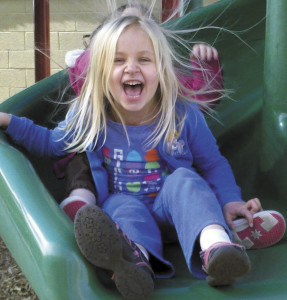 Playgrounds, circle times and sing-a-longs are often the scenes one pictures when thinking about preschool.
Playgrounds, circle times and sing-a-longs are often the scenes one pictures when thinking about preschool.
Although these sweet little scenes are very important in the preschool day, in early childhood education today, children have more well-rounded experiences, which foster development in the whole child.
In order for children to become the self-sufficient, problem solving, socially capable adults we want to send out into society, the adults surrounding them must help them develop physically, socially, emotionally and cognitively. This is what it means to foster development in the whole child. This process starts in the earliest learning years of life.
It has become an increasing need for young children to be exposed to quality preschool environments to give them their greatest chance at development in all four areas. Quality preschools, such as Bridges Preschool and Kindergarten, will provide meaningful social experiences of various sorts.
Exposure to different social scenarios will teach children how to interact in small groups, large groups and in one-on-one situations. Bridges supports social development by providing large group projects like circle time and gardening. Small group experiences are integrated into the day, with activities like cooking projects, science experiments and opportunities for imaginary play. This invites collaborative learning, social problem solving and language development.
Cognitive development is evident in quality preschools when hands-on/hands-in pre-mathematical concepts are being taught, sensory and science projects are continuous and ongoing, art projects are open ended, and children are invited to solve various puzzles and problems independently.
Teachers should guide the learning experience by being facilitators in the classroom who expand on children’s learning with use of extended language and thought-provoking questions. The teachers at Bridges are highly knowledgeable in the type of rich learning activities to set up in order to promote higher level thinking skills. The teachers take those activities and add meaning and value to the experiences through use of language, thought-provoking questions and gathering documentation with the children.
Bridges has Adventure Playgrounds, which are extensions of the learning experiences and provide areas for physical development. Playgrounds should have a variety of elements for interactive learning, social experiences and physical movement. Mud kitchens, music gardens, climbing features and outdoor art should be available to children on the playground.
Cognitive, social-emotional and physical developmental opportunities, combined with degreed, experienced teachers is what makes an early education environment capable of developing the whole child.
For more information about Bridges Preschool and Kindergarten, visit the website at www.bridgespreschool.com.

